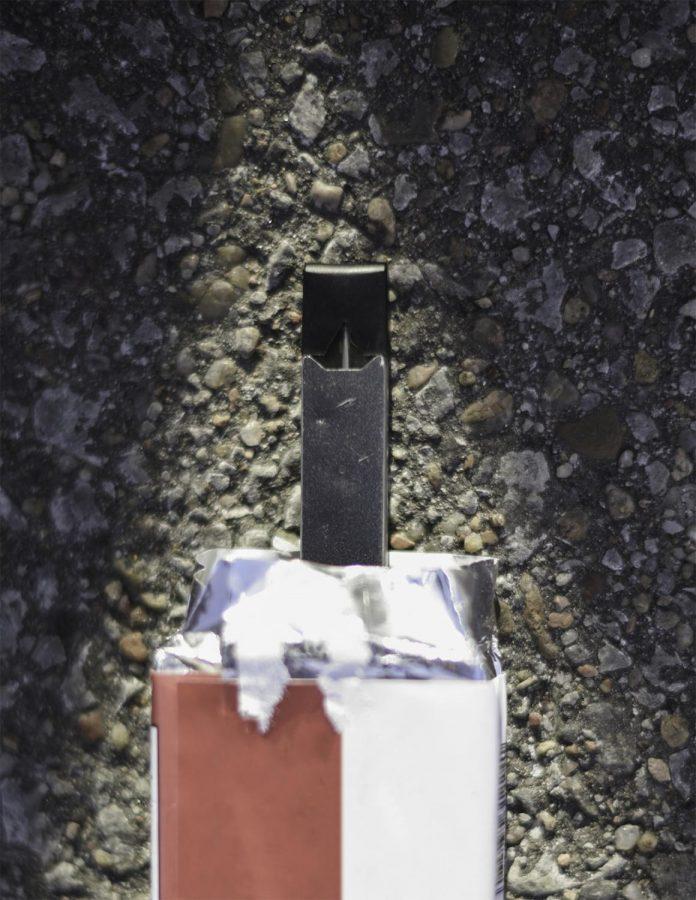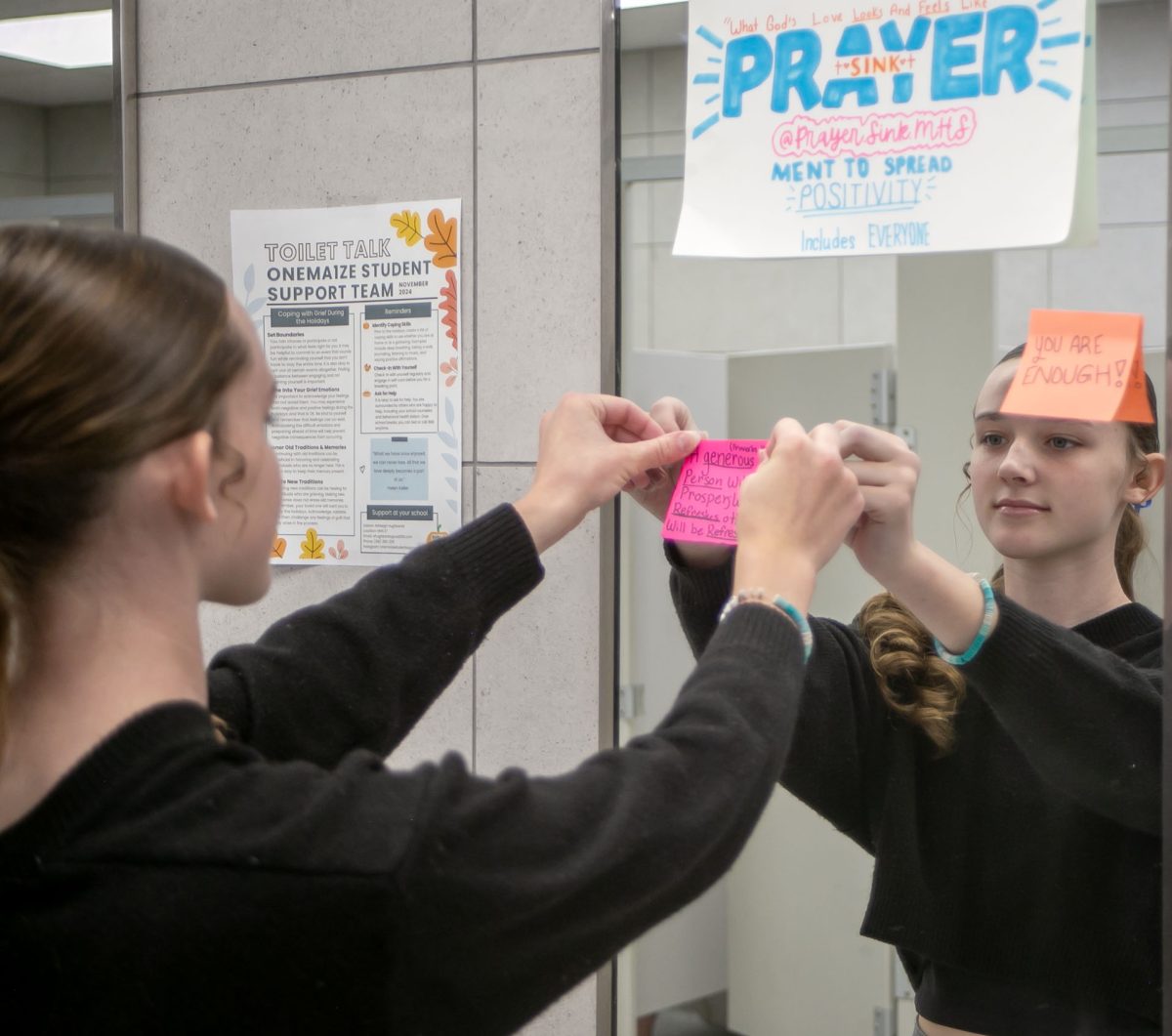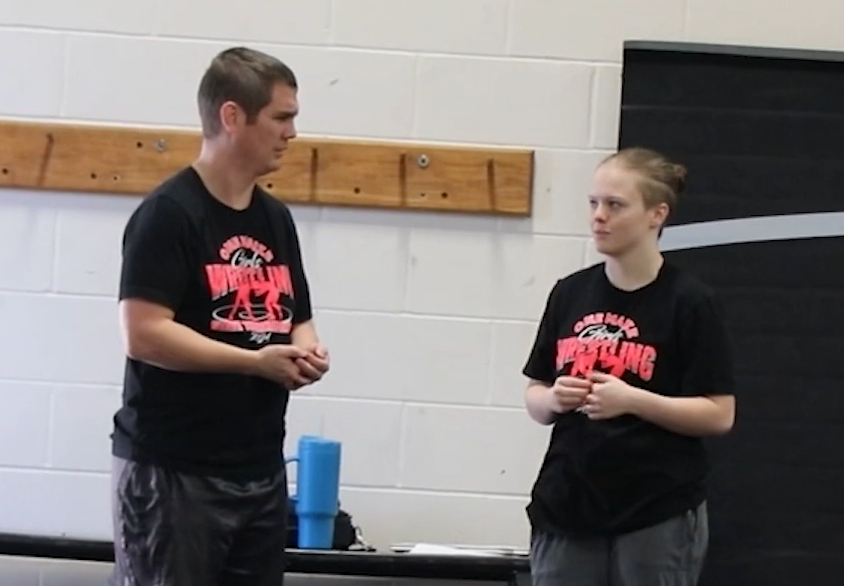Smoke and mirrors
A look into the connection between teens and Juuls
October 1, 2018
Some students believe it’s the newest trend.
Doctors say it’s harmful for health.
The school district has suspended students for using them on campus.
The FDA says it is an epidemic.
The topic of teen Juuling is controversial for both teens and adults alike, and everyone seems to have their own perspective on it.
A Juul is an easy-to-use vaporizer designed for adult smokers looking for an alternative to smoking cigarettes. Juulpods click into the top of the Juul, containing Juulsalts, a liquid formula based on nicotine salts. These pods can also contain THC or other drugs. For a 17-year-old Maize student, this trend has become part of the student’s life.
“It’s like a tweet gone viral,” said the student, whose identity is being withheld to protect them from being punished. “It’s like when someone sees it, they’ll retweet it. It is a trend, they think it’s cool. It gives some kids a release, but with others, and a lot of people, I think it’s peer pressure. They think rebelling is cool.”
The student said they first started smoking frequently in their freshman year but later started using a Juul. Once the Juul came out, the student acquired one through a friend above the age 18 because the student is minor.
“It was that peer pressure thing,” the student said. “In my opinion, it’s a better alternative [to harder drugs]. I feel like I am not strong enough to say ‘no’ yet.”
The minor said they view Juul usage among teens as a phase due to the outlet for stress-relief that the product provides.
“I think that it’s a teenage thing,” they said. “You don’t see 50-year-olds partying all the time and getting drunk. But right now everything is piling on me and this is a good release. Yes, there are other things you could do [to relieve stress], but I feel like people think this is the most accessible way.”
The student said the bathroom is a common spot for students to Juul in school.
“I get super anxious, so I’ll go to the bathroom, or just literally anywhere with no cameras, and take a couple pulls,” the student said. “It just relaxes my body and I kind of just tell myself ‘OK, deep breath. You got this,’ and I go back to class.”
Although the student actively uses a Juul in school, the student believes school administration cracking down on Juul usage is their right.
“What the school is doing, I don’t think it’s bad.” they said. “The school wants positive role models for their students. It’s their choice. If for the betterment of the school if they want to ban things, they can ban them. Most especially if they are illegal.”
‘It’s new to us, too’
Juul usage has been on the rise since 2017 when the company was founded. Just in the first few weeks of school, five Maize High students were suspended for having Juuls on school property.
The U.S. Food and Drug Administration compliance checks have uncovered 40 violations for illegal sales of Juul products to youth. The FDA has issued 40 warning letters for those violations.
On Sept. 12, the FDA declared that teenage use of electronic cigarettes has reached “an epidemic proportion.” The FDA gave Juul, and five other large e-cigarette companies, 60 days to prove that they can keep their products away from minors, or their product will be pulled from the market.
“Juul Labs will work proactively with the FDA in response to its request,” a Juul spokeswoman told the New York Times: “We are committed to preventing underage use of our product, and we want to be part of the solution in keeping e-cigarettes out of the hands of young people.”
Principal Chris Botts said he believes the use of e-cigarettes has become a trend among high school students.
“It’s new, it’s targeted towards teenagers, and it’s easy to hide,” Botts said.
The district has a contract with a drug dog company that comes in randomly throughout the school year. One K9 unit search has been conducted this year, and Botts believes this search is the reason the number of Juul-related suspensions has been so high.
“It’s new to us too, and it’s hard to detect because there’s hardly any vapor trail,” Botts said. “If you walked in [a bathroom] you would definitely smell cigarette smoke or marijuana.”
School policy states that use or possession of any tobacco products on school grounds or at school activities is considered major misconduct. If a student is found in possession of an electronic cigarette or vaporizer containing nicotine, it will result in a three-day suspension, followed by a drug test. If the drug test comes back positive, it results in a 10-day out-of-school suspension.
“I think students can do whatever the heck they want to do when they aren’t at school,” Botts said. “That’s their choice. My job is keep our school and the students safe. I can’t in good conscience say that’s it’s OK to do here at school.”
Botts has two children who go to Maize schools and values educating them to make good choices in and out of school.
“As a dad, it scares the heck out of me,” he said. “It’s impossible to be with her [his daughter] at all times, so you hope that you’ve raised your kids to make good decisions and know that they’re going to mess up. That’s part of being a teenager, learning from it and growing from it.”
‘The very first guinea pigs’
School administration aren’t the only ones concerned about the teen use of Juuls.
Doctors and specialists have been doing research on the effects of nicotine on teens, including Linda Gibson-Young. Gibson-Young, an instructor at Auburn University, has been doing research on the use of Juuls among the youth population and has written medical literature on its effects.
She is concerned about how much nicotine teens are getting from using Juuls. She said one Juul pod is equal to one pack of cigarettes when it comes to nicotine content.
“We’ve had story after story explained to us in the clinical setting that students will try to inhale as much as they can before they go to the next class,” Gibson-Young said. “So the youth are actually getting much higher doses of nicotine.”
Gibson-Young said addiction to nicotine can cause withdrawal in the body, causing nicotine to have a calming effect on the mind. That, in turn, only deepens the addiction.
“When you initially get the exposure to nicotine, you get the elevated heart rate, but it’s as your body has that withdrawal from the nicotine then you get the irritability, anxiety and just difficulty focusing,” Gibson-Young said. “You start to respond by wanting more nicotine in the body.”
Gibson-Young said she believes the biggest threat to teens is the potential developmental damage caused by nicotine.
“The brain is still growing through the teen years, so the more chemicals that you put into the brain or more effects that you have on the central nervous system, the greater damage you can have long-term because you can damage your brain while it’s still growing.”
Amy Seery, MD, is a pediatrician at Via Christi. She said the most important thing for teens to know is that these products have not been well studied.
“The problem is, it can take decades for these problems to manifest,” Seery said. “Teenagers are willing to be the very first guinea pigs in a real-life study as to how harmful these may or may not be. When we find out later, 20 or 30 years later, about the horrible cancers and the devastating physical effects of these products, it may be too late for the people who are choosing to use them.”
Seery said she believes companies like Juul are aggressively targeting teenagers through ad campaigns, visual appeal and especially the flavors available.
“ I can guarantee you they’re not advertising unicorn poop as a flavor to my grandmother.” she said. “That’s a very specific target audience for that flavor. Letting yourself get manipulated sucks.
Don’t let the tobacco industry let you poison your body and make you waste your money. There’s better things to do with your time.”
‘We are not really grown people yet’
A 17-year-old student quit using e-cigarettes because of being unable to pay for it, but the student has adopted a different outlook on teen usage of e-cigarettes.
“They don’t really think that there is anything wrong with doing it,” the student said. “I don’t think the kids that are doing it are grown up enough to just own up to that they are doing something that maybe they shouldn’t be doing. I just don’t think that the people who do it are really open often or self-aware enough to understand that it’s not a good thing.”
The student obtained their e-cig from an older family member. They said vaping was just something they did, but now said they believe using a product such as Juul isn’t a good decision, especially for teenagers.
The student said another reason teens might be Juuling is because of they are trying to figure out who they are.
“We are not really grown people yet,” the student said. “We are still figuring out what we want to do, or who we are, so doing things like this that could possibly put you in a different light could be the reason why you do it,” the student said. “I think that a part of it is they don’t know what they want, so they go and attach themselves to something that is popular.”
In the state of Kansas, you must be 18 to purchase products containing nicotine through a face-to-face retailer.
Mike Thornbrugh, manager of public and government affairs for QuikTrip, said it is important for QT to handle sensitive items with extreme caution.
“If you appear to be under the age of 40, we are going to ask for identification to make sure that an individual is of age,” Thornbrugh said. “We don’t make moral decisions in regards to that [selling Juuls to minors]; we have to make sure you are of age.
“Our deal is you aren’t going to buy from us. If so, we’ll take care of matters. If somebody wants something, they’ll get it somehow, someway, but not from us.”
‘They don’t care; it’s cool’
There are many students who haven’t attached themselves to Juul products. A 15-year-old Maize student has chosen not to Juul despite having many friends do it.
“I see how my peers use them and that setting I get in when they are using it is toxic, and I don’t want to be around stuff like that,” the student said.
The student said they do not allow their friends to Juul around them, and if friends Juul around them, they will leave. The student believes that teens are Juuling simply because it’s a current trend.
“Just like smoking was popular back then, like you could smoke on an airplane,” the student said. “It was something that was cool back then and now people are dying from lung cancer. They don’t care; it’s cool.”
The student said they have confronted their friends about using a Juul and feels the only reason they Juul is because they want to fit in.
“You should have your own morals,” the student said. “The fact that those [morals] don’t matter to you because it’s a trend is kind of disgusting. That upsets me because you could be doing so many other things, and you’re here Juuling. I’d rather see you drink seven Starbucks venti pumpkin spice lattes. Ewwww, but better than Juuling.”
A 15-year-old student said they first began to Juul after a few friends let them try it. They said after trying it once, they thought it was fun and wanted to try it again. The student said friends would let them borrow their Juuls to use in the bathrooms during lunch. They said it developed into an addiction at the beginning of sophomore year.
“If I saw [a Juul] I’d be like ‘Hey, let me hit that,’” the student said. “I didn’t even care who it was, and I’d literally go ask them.”
The student said Juuling was a way to get rid of the goody-goody label they felt they had in middle school. They said it was a way to change in high school, and the student knew it was bad, but the peer pressure turned into addiction.
“You just forget about everything when you’re on that buzz,” the student said.
Because of the recent suspensions, though, the student decided to quit Juuling to protect their future and had not Juuled for two weeks and plans to continue to abstain from using it.
“I just look at my future and think ‘OK, I can go down this path and Juul every day and buy myself a Juul and then get caught and freaking work at McDonalds for the rest of my life, or I can stop, actually focus on school, and go to college and make money,” the student said. “I’d rather do that one.”






